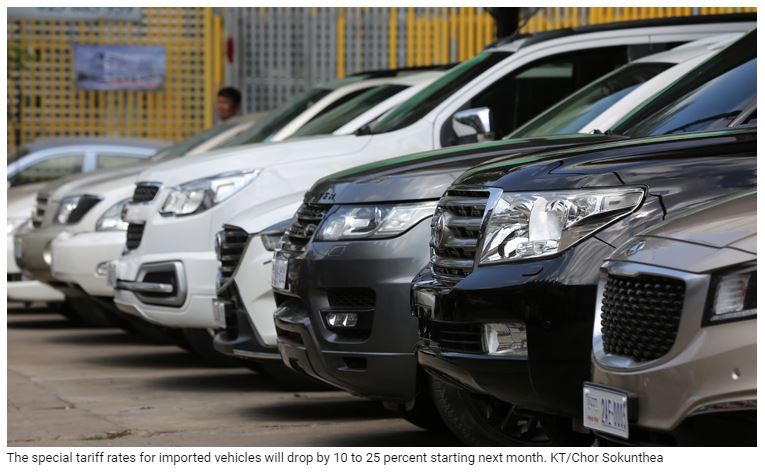Cambodia: Special tariffs cut to boost auto sales
From early next month, the special tariffs on imported family vehicles will be reduced by 10 to 25 percent according to engine size, according to an announcement from the General Department of Custom and Excise.
The rate for imported electric family and passenger cars will be reduced from 30 percent to 10 percent and the rate for semi-trailer trucks will drop from 40 to 25 percent.
Lorries with a gross vehicle weight over five tonnes will have the tariff on them reduced from 40 to 30 percent. Dump trucks, cranes, drilling trucks, concrete mixers and vehicles that carry explosive materials will see a rate cut from the current 40 percent to 30 percent.
Ngorn Saing, chief executive officer (CEO) of RMA (Cambodia) Plc, welcomed the government’s move. He added that the reduced tariff costs, will enable more vehicles to be sold, with price reductions of $1,000 to $10,000, depending on the type of vehicle, compared with the old tariffs.
He added sales across the automotive industry fell 30 percent in 2020, with RMA’s sales dropping around 5 percent last year.
RMA (Cambodia) is an automotive, agriculture and heavy equipment-distributor incorporated in Cambodia.
It is the distributor and provider of warranty and after-sales service for world-leading brands including Ford, Jaguar, Land Rover, John Deere, TCM, JCB, FUSO and Piaggio.
According to a company report, the Ford business segment is a major part of the company’s current revenue structure.
Saing added that the reduced import tariffs are a good measure given that the average amount of tariff paid on a new car is triple that for a used car. If new cars sell well, the government’s income will not be reduced.
“With this reduced tariff rate, some people will be able to afford the cost of a new car, so we hope that sales will increase. We are importing vehicles with the latest technology. We are improving after-sales service and we are increasing the number of workshops,” Saing added.
The RMA (Cambodia) CEO noted that in 2020 his company sold more than 6,000 vehicles. “I think that this year, the sales will increase to around 7,000 new cars,” he said.
According to Saing, the reason for his growth projection is the availability of COVID-19 vaccines, the Kingdom’s economic growth recovery, growth in construction and real estate and signs that the world will soon manage the spread of the COVID-19 pandemic.
Peter Brongers, chairman of the Cambodian Automotive Federation, said that Cambodia has some of the highest tariffs on imported vehicles in Southeast Asia and car prices here are too high as a result, so people are still importing used cars which pollute the environment more.
“If you want to have safer and cleaner cars then you need to cut down on supplying used ones. I think it is a good step to reduce the special tariff rate, but it is not good enough because it should be reduced more to align with Thailand, Vietnam and Malaysia,” Brongers added.
“If you want to upgrade a car then it is a move in the right direction. Also, under the Kingdom’s current economic climate, the purchasing power of many consumers is a bit less than it was, so the reduced tariff will also help to boost more purchases of new cars. Imported new cars now account for 20 percent of the cars on the road, while used cars make up around 80 percent. But it is a better situation than five to 10 years ago when only 10 percent of cars on the road were new,” he added
Brongers added that import tariffs should be reduced more to make it easier to import new, clean, safe and more energy-efficient cars.
According to the RMA report, the COVID-19 pandemic in Cambodia significantly affected both demand and supply, especially in the second quarter of 2020. Demand was hit by delays and cancellations of major private and public sector projects, a reduction in consumer confidence, lack of tourism and a badly damaged hospitality business alongside more cautious bank lending.
By the end of the fourth quarter, sectors such as tourism and hospitality were still severely affected by the pandemic.
Supply was initially affected by lockdowns, notably at the Ford factory in Thailand, but has subsequently returned to normal, starting in the third quarter of 2020.
The Ford business segment is made up of vehicle sales, after-sales service and spare parts. It accounted for 82.5 percent of the company’s Q42020 revenues (vs 83.4 percent of its Q42019 revenues) as well as 87.2 percent of the company’s 2020 revenues versus making up 86.1 percent of its 2019 revenues.
Ford revenues for the whole of 2020 were up 54.9 billion riels (a rise of 5.6 percent against 2019) as a result of the company’s strong Q1 and Q42020 unit sales, offset by the lower unit sales in both Q2 & Q32020,that were attributed to the COVID-19 pandemic.
Source: https://www.khmertimeskh.com/50816772/special-tariffs-cut-to-boost-auto-sales/


 English
English




